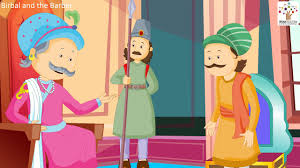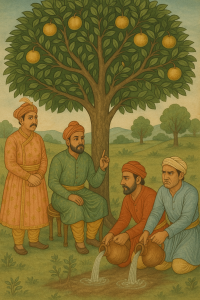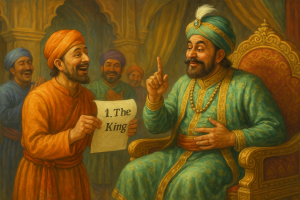The Root of Envy
Envy, a powerful and destructive emotion, can lead individuals to commit acts that are harmful not only to others but ultimately to themselves. The story of Birbal and the barber in the court of Emperor Akbar serves as a classic example of how envy can lead to one’s downfall.
Birbal: The Clever Hindu Minister
Birbal, also known as Mahesh Das, was a trusted and clever minister in the court of the Mughal Emperor Akbar. Despite being the only Hindu minister in a predominantly Muslim court, Birbal had earned Akbar’s favor and respect due to his wit and intelligence. This, however, did not sit well with the other Muslim ministers, who were envious of Birbal’s position and influence.
Unable to tolerate the success of a Hindu in the royal court, the Muslim ministers conspired to get rid of Birbal. They knew that directly confronting him would not work because Birbal was too clever and had the emperor’s trust. Instead, they decided to use Akbar’s barber to carry out their plan, thinking that a subtle and cunning approach would be more effective.
The Barber’s Deceptive Plan
The barber, eager to gain favor with the ministers and motivated by the promise of 100 gold coins, agreed to help. The next day, while shaving Akbar, the barber subtly suggested that the emperor, who had done so much for his subjects, should also think about his forefathers. He cleverly planted the idea that Akbar’s ancestors, who were presumably in heaven, might be in need of something, and that someone should be sent to check on them.
Akbar, impressed by the idea and unaware of the barber’s ulterior motives, asked how such a task could be accomplished. The barber, seizing the opportunity, suggested that Birbal, being wise and clever, should be the one to go to heaven, as he could not only check on the emperor’s ancestors but also return to report their needs.
The method proposed by the barber was as bizarre as it was sinister: Birbal should be buried under a pile of hay and set on fire, with the idea that he would ascend to heaven on the smoke. The real intent, of course, was to kill Birbal under the guise of this so-called “mission.”
Birbal Outsmarts the Conspirators
Birbal, always quick-witted, immediately saw through the plot. He requested some time to settle his affairs before undertaking the journey to heaven. During this time, Birbal secretly dug a tunnel from the spot where he would be buried to his own house. When the day arrived, Birbal allowed himself to be covered in hay and set on fire, but he escaped through the tunnel and disappeared.
For six months, Birbal remained hidden, allowing his beard and hair to grow long, making him unrecognizable. In the meantime, the ministers and the barber were overjoyed, believing that Birbal was gone for good. The barber was rewarded with the promised gold coins, and the ministers celebrated their perceived victory.
Birbal’s Return and the Barber’s Punishment
After six months, Birbal returned to the court, disguised and unrecognizable. When he revealed himself, the court was stunned. Akbar, relieved and overjoyed to see Birbal alive, asked him about the condition of his ancestors in heaven. Birbal, with his usual cleverness, replied that they were well but had one complaint: there were no barbers in heaven, and they needed one.
Akbar, trusting Birbal and still unaware of the conspiracy, agreed to send his royal barber to heaven. The barber, realizing too late that his own plot had backfired, was forced to undergo the same treatment he had devised for Birbal. This time, however, there was no escape, and the barber met his end.
The Moral: The Destructive Power of Envy
This story illustrates the destructive nature of envy. The Muslim ministers’ envy of Birbal led them to plot against him, but in the end, their plan backfired, leading to the death of the barber, who had allowed himself to be used as a pawn. The ministers’ envy not only failed to remove Birbal from his position but also brought about their own disgrace when their scheme was exposed.
Envy is a powerful emotion that can cloud judgment and lead to irrational and harmful actions. It often results in more harm to the person who harbors it than to the intended target. In this case, the barber’s envy-driven actions led directly to his downfall, while Birbal’s cleverness and calm in the face of adversity allowed him to turn the situation to his advantage.
Conclusion: Overcoming Envy Through Humility and Devotion
The story of Birbal and the barber teaches us the importance of humility and the dangers of envy. It is easy to become envious of others’ success, but acting on that envy can lead to one’s own destruction. Instead of allowing envy to take root, we should focus on our own duties and seek to improve ourselves through hard work, humility, and devotion to higher principles.
In spiritual life, overcoming envy is essential for progress. When we place Krishna at the center of our lives, as the true center of the compass, we avoid the clashes and conflicts that arise from selfish desires and envy. By focusing on service and devotion, we can rise above the destructive emotions that lead to suffering and misery.
A Prayer for Freedom from Envy
O Lord Krishna,
Cleanse our hearts of envy and jealousy,
And fill them with humility and contentment.
Help us to see the success of others with joy,
And to focus on our own spiritual growth.
May we never be driven by envy or hatred,
But always act with love and compassion.
Guide us to place You at the center of our lives,
So that we may live in harmony with others,
And find true peace and happiness in Your service.



